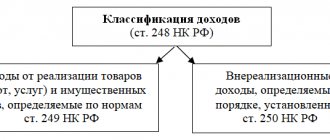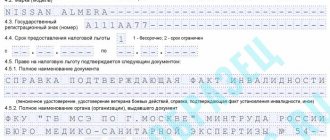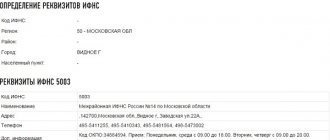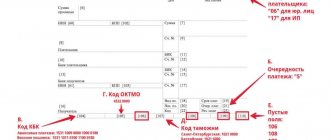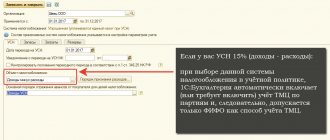We submit an application to appeal the decision of the tax service to the court of first instance
In order to invalidate the decision of the tax authorities, you first need to contact the arbitration court at the location of the tax authority with an application (clause 4 of Article 138 of the Tax Code of the Russian Federation, subclause 2 of clause 1 of Article 29, Articles 34, 35 of the Arbitration Procedure Code of the Russian Federation).
Applications of taxpayers - individuals who do not have the status of an individual entrepreneur are considered in courts of general jurisdiction (clause 4 of article 138 of the Tax Code of the Russian Federation, article 24 of the Code of Civil Procedure of the Russian Federation, clause 2 of part 2 of article 1, article 19, part 1 Article 22, Parts 1, 5, Article 218, Part 3, Article 24 CAS RF).
According to paragraph 2 of Art. 138 of the Tax Code of the Russian Federation, before going to court, the taxpayer is obliged to go through the procedure of pre-trial dispute resolution.
ConsultantPlus experts explained step by step how to properly fill out the documents and where to submit them. If you do not have access to the system, get a trial online access and upgrade to the ready-made solution for free.
Consideration of applications takes place in accordance with the rules of claim proceedings and the features established by Chapter. 24 Arbitration Procedure Code of the Russian Federation.
The judge alone considers the case for no more than 3 months, including the period for preparing for the trial and making a decision. This period may be extended if the case turns out to be quite complex or a large number of participants will be involved in the process (Clause 1 of Article 200 of the Arbitration Procedure Code of the Russian Federation).
If the decision of the arbitration court does not suit the taxpayer, then he can appeal it to higher courts.
It will no longer be possible to appeal to the arbitration court again based on the same decision of the tax authority, even if new arguments are later presented to substantiate the applicant’s position. When re-applying in the same case, the arbitration court must terminate the proceedings with reference to clause 2 of part 1 of Art. 150 Arbitration Procedure Code of the Russian Federation. The taxpayer will be denied the renewal of the same case (Part 3 of Article 151 of the Arbitration Procedure Code of the Russian Federation).
Example
The arbitration court received an application from the taxpayer to recognize the decision based on the results of the tax audit as illegal due to violations by the tax inspectorate committed during the audit. No other arguments were stated. The court did not satisfy the applicant's request.
Later, the taxpayer again applied to arbitration with an application to invalidate the same decision, in which he indicated that additional income tax assessments were made unlawfully. Although the application presented new arguments, the court is obliged to terminate the proceedings in this case.
See also “The procedure for appealing a tax authority’s decision in court.”
The payer is not familiar with all the audit materials.
Clause 3.1 of Art. 100 of the Tax Code of the Russian Federation establishes that the tax authority must attach to the tax audit report documents confirming facts of violation of the legislation on taxes and fees identified during control activities. In this case, documents received from the person being inspected are not attached to the act.
From the legal position of the Presidium of the Supreme Arbitration Court, set out in Resolution No. 15726/10 dated November 8, 2011, it follows: the taxpayer’s right to timely familiarization with all materials
received by inspectors as part of their inspections is his inalienable
right
. However, in order to recognize the fact of a violation of the essential conditions of the tax audit procedure, resulting in the payer’s inability to familiarize himself with these materials and submit appropriate objections, it is not enough to indicate that he has such a right. Therefore, before canceling a decision on formal grounds, you should find out what documents and information are being discussed and how such information affects the conclusions of the tax authority recorded in the tax audit report.
In other words, the inspectors’ violation of clause 3.1 of Art. 101 of the Tax Code of the Russian Federation does not yet mean that their decision will be declared invalid by the court on procedural grounds. In each specific case, the arbitrators examine the case materials and give them an appropriate assessment.
Let's give an example - Resolution of the FAS VSO dated January 30, 2014 No. A78-1414/2013. The taxpayer challenged the inspectorate's decision in court, including on formal grounds. According to the claim, the tax authority did not attach all the documents named in this act to the on-site inspection report: there were no copies of statements of transactions on the accounts of counterparties, inspection reports, or information from the information resources of the tax service. This, in the opinion of the person being inspected, violated his rights to protect his interests.
The judicial authorities recognized the taxpayer's arguments as justified. The judges decided: these circumstances deprived him of the opportunity to verify the authenticity of these documents, give a legal assessment of the admissibility and relevance of the evidence obtained confirming his guilt in committing a tax offense, and, accordingly, present his explanations and objections on the merits of the violations established by the inspection.
Supporting the taxpayer, the arbitrators noted: not only the full reflection of the identified violations in the tax audit report, but also the subsequent study and drawing up of objections by the taxpayer to it are a prerequisite
implementation by the tax authority of further procedures for holding the taxpayer accountable. Therefore, the inspection’s failure to comply with the requirements of clause 3.1 of Art. 100 of the Tax Code of the Russian Federation influenced the objectivity of the consideration of audit materials and deprived the organization of the opportunity to fully exercise the right to protect interests. Consequently, the violation committed must be qualified as significant and constitute a basis for invalidating the inspection decision.
Similar conclusions were made in the resolutions of the Federal Antimonopoly Service of the North Caucasus Region dated 02/13/2014 No. A53-5717/2013, No. A53-28709/2012 dated 07/08/2013, and No. A78-4232/2012 of the FAS VSO dated 02/15/2013.
The arbitrators of the FAS ZSO (Resolution No. A70-1252/2013 dated February 27, 2014) also came to the conclusion that the inspectorate committed procedural violations in the form of failure to send to the taxpayer all the necessary documents (including the protocol of interrogation of a witness). However, the judges found the following facts:
- the company has received an on-site inspection report and objections have been submitted to it;
- excerpts from the controversial protocol of the interrogation of the witness are given in the report;
- taxpayer representatives are familiar with the documents collected by inspectors during tax control activities;
- the society is provided with the opportunity to participate in the process of reviewing tax audit materials;
- the taxpayer did not indicate what specific rights and legitimate interests were violated on the merits when the inspectorate did not send the controversial interrogation protocol and how this violation affected his right to challenge the conclusions of the tax authority on the merits.
As a result, the arbitrators did not recognize the violation as significant enough to cancel the inspection decision for the reason specified by the taxpayer.
The judges took a similar position when making decisions of the FAS ZSO dated September 25, 2013 No. A27-19122/2012, FAS TsO dated March 18, 2014 No. A35-2512/2013.
Interesting, in our opinion, is the situation considered by the arbitrators of the FAS MO (Resolution No. F05-532/2014 dated February 20, 2014). The taxpayer considered that the inspection violated the audit procedure by not providing him with copies of requests and responses from counterparty banks. This did not allow the organization to find out whether these documents were received directly as part of the on-site inspection. The taxpayer believes that, by virtue of clause 14 of Art. 101 of the Tax Code of the Russian Federation, these circumstances are grounds for canceling the inspection decision.
The court did not agree with the taxpayer. The arbitrators found that, as attachments to the inspection report, the company was given copies of bank statements of its counterparties. According to the judges, the requests sent by the inspectors to the bank for the presentation of these statements do not contain facts indicating a violation of tax legislation by the taxpayer. Therefore, they should not be included in the appendices to the inspection report. Consequently, there are no violations of the audit procedure on the part of the tax authority.
What are the deadlines for appealing a tax authority’s decision in an arbitration court?
A taxpayer may go to court if he is not satisfied with the result of the consideration by a higher tax authority of his complaint (appeal). Tax authorities must make a decision on the complaint within 1 month. from the date of its receipt (clause 6 of article 140 of the Tax Code of the Russian Federation).
Please note that the period for consideration of a complaint may be extended, but not more than by 1 month, of which the taxpayer must be notified within 3 days from the date such a decision is made by a higher tax authority.
Within 3 months after receiving the decision of a higher tax authority on the audit, the taxpayer may go to court to appeal this decision (part 4 of article 198 of the Arbitration Procedure Code of the Russian Federation, paragraph 1 of article 219 of the CAS RF, paragraph 3 of article 138 Tax Code of the Russian Federation). If the higher tax authority does not have time to make a decision on the taxpayer’s complaint within the time limits established by clause 6 of Art. 140 of the Tax Code of the Russian Federation, the taxpayer can go to court without waiting for this decision to be made (paragraph 2, paragraph 2, paragraph 3, article 138 of the Tax Code of the Russian Federation).
The 3-month period is calculated in accordance with the standards established by Art. 113, 114 of the Arbitration Procedure Code of the Russian Federation or Art. 107, 108 Code of Civil Procedure of the Russian Federation, Art. 92.93 CAS RF. Often, courts will restore the deadline for filing an application, but only if they consider that it was missed for a good reason.
2nd sample: complaint about inaction of the tax inspectorate
Another option for the name of such a complaint could be “Sample complaint about inaction of the tax authority.” In this case, the inaction of inspection officials is being appealed. Moreover, the nuances of the appeal are almost identical to those stated above. True, the review period in this case is 15 days with the possibility of extension for another 15, and not 30, as in the previous version.
Technical details of the application
The application must be formulated correctly and clearly. It is best to provide links after each argument:
- on the legislative acts and norms of the Tax Code in force at the controversial moment;
- links to judicial acts issued by the Supreme Arbitration Court of the Russian Federation, the Supreme Court of the Russian Federation or arbitration courts of your judicial district;
- clarifications from the Ministry of Finance and the Federal Tax Service of Russia, if they correspond to the controversial issue.
You should definitely pay attention to the following circumstances that may influence the court’s decision if the taxpayer is nevertheless held accountable:
- circumstances excluding prosecution (Article 109 of the Tax Code of the Russian Federation);
- mitigating circumstances (Articles 112, 114 of the Tax Code of the Russian Federation);
- circumstances excluding the taxpayer’s guilt in committing an offense (Article 111 of the Tax Code of the Russian Federation), etc.
Thus, drawing up an application to the court is quite difficult, so it makes sense to turn to competent lawyers to complete this task.
Why can the tax office bring administrative liability?
Modern legislation is replete with sanctions in relation to a number of violations in the tax and financial sphere. This includes improper handling of cash and various violations in tax and accounting records.
Administrative responsibility and issues such as delays in filing a tax return were not overlooked. In addition, sanctions may also affect those who conduct illegal transactions with alcohol or tobacco.
Along with management, administrative sanctions may also affect the company itself. An example of this is the liability of an enterprise for violations of cash handling rules.
However, regardless of who suffered, you should begin appealing the tax authorities’ decision to impose administrative liability as soon as possible. In this case, invalidation of the decision of the Federal Tax Service on bringing to administrative responsibility is possible both through the body of the highest rank and through the court.
What documents should be attached to the application to the arbitration court?
The application is usually accompanied by the documents listed in Art. 126 Arbitration Procedure Code of the Russian Federation. Here are the most important of them:
1. A copy of the contested decision of the tax authority (Part 2 of Article 199 of the Arbitration Procedure Code of the Russian Federation).
2. A copy of the decision of the higher tax authority on the taxpayer’s complaint.
This document is proof that the pre-trial appeal procedure was followed, since it is possible to go to court with a statement only after appealing the decision of the tax authorities to a higher tax authority (clause 7, part 1, article 126, part 2, article 199 of the Arbitration Procedure Code of the Russian Federation).
If the higher tax authority did not make a decision in a timely manner, then you can attach to the application a copy of the complaint with a note from the higher tax authority about its acceptance or a copy of the list of contents in the postal item and notification of its delivery, if the complaint was sent by mail.
3. Petition to suspend the action of the disputed decision of the tax authority (Part 3 of Article 199 of the Arbitration Procedure Code of the Russian Federation, information letter of the Presidium of the Supreme Arbitration Court of the Russian Federation dated August 13, 2004 No. 83).
If the application to the court is submitted electronically, then all attached documents are also submitted electronically (paragraph 2, part 1, article 41, part 2, article 126 of the Arbitration Procedure Code of the Russian Federation).
In addition, all documents attached to the application, along with the application itself, must be sent to the tax service and all persons involved in the case. Documents should be sent by registered mail with return receipt requested. Receipts evidencing postal items are attached to the statement of claim submitted to the arbitration court (clause 1, part 1, article 126 of the Arbitration Procedure Code of the Russian Federation).
Learn the basic rules for resolving tax disputes from this publication .
Interim measures
The use of interim measures serves as a guarantee that the person will not evade the obligation to compensate the amounts provided for in the decision. This concept is known from judicial procedure. The plaintiff files an application for interim measures if the adopted act violates his rights. The law establishes the only basis for such a decision.
Interim measures are applied if there are sufficient grounds to believe that the subject being inspected is dishonest. The lack of specific conditions often leads to excessive use of such an institution.
Often an immediate decision is made. Perhaps the justification lies in the internal instructions of the tax authorities, the effect of which is not made public, recognizing the failure to take interim measures as unacceptable. However, according to the law, their introduction is a right and not an obligation of the inspectorate.
Depending on the status of the decision made, there are preliminary interim measures (related to a document that has not entered into force) and interim measures aimed at the execution of a valid decision. The first option is due to the long period provided for filing complaints. Preliminary interim measures allow you to insure against the possibility of the entity selling its assets during the appeal period.
There is also a legal classification. Part 10 art. 101 of the Tax Code provides for certain types of interim measures. These include the following:
- prohibition on the sale or pledge of property. When applying interim measures of this type, a sequence is established from softer to more stringent restrictions if there is a failure to comply with the decision. The first step concerns real estate. The next level of interim measures involves restrictions on transport, as well as securities of various types. They also relate to items that make up office design. All other property is subject to the following interim measures. The exception is raw materials, materials necessary for production, as well as finished products. The last step sets absolute limits. They will not be canceled until the goal is realized;
- the decision to apply interim measures may consist of suspending transactions on bank accounts. Such information is available to tax authorities, so they most often resort to this type. Very often, preliminary interim measures concern a bank account.
The decision to apply interim measures can be combined. The law does not limit tax authorities to choosing a single type.
The circle of authorized entities is limited. The decision to apply interim measures can be made by the head of the inspectorate or his deputy.
The procedure for when they cease to operate is also similar. Cancellation of interim measures is carried out by the same persons.
Results
An application to the court can be submitted on paper or electronically. State in it the arguments supporting your position. Explain why you think the tax authorities’ arguments do not correspond to reality and/or the law.
Please attach supporting documents and other papers from the list specified in Art. 126 of the APC (copies of the contested decision of the tax authority, copies of the decision of the higher tax authority on the taxpayer’s complaint, etc.).
For information on what form to use to file objections to an audit report, read the material “Writing objections to a tax audit report—sample.”
You can find more complete information on the topic in ConsultantPlus. Free trial access to the system for 2 days.
